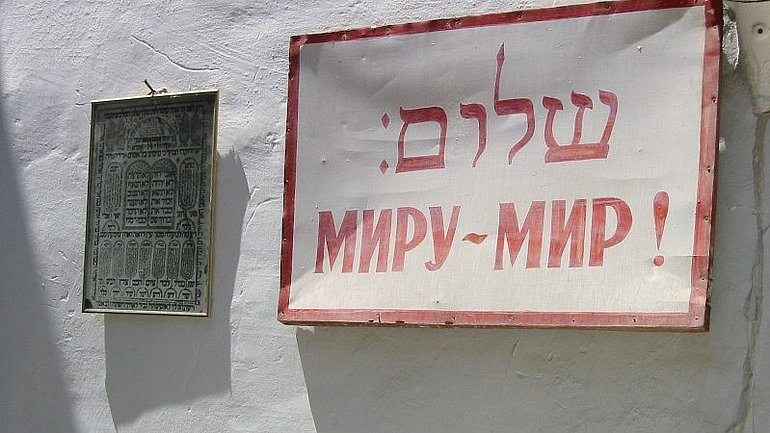Jews along the Silk Road
Call for Papers | Conference 10-12 October 2021

International conference of the W. Michael Blumenthal Academy of the Jewish Museum Berlin in cooperation with the Center for Eastern European and International Studies (ZOiS, Berlin) and the Viadrina Center B/ORDERS IN MOTION at the Europe-University Viadrina Frankfurt (Oder)
How do Jews live between Baku and Berlin, between Tashkent and Tehran, Dushanbe and Tel Aviv? How did experiences of convival living with Muslim, Christian or secularized majority and minority populations shape Jewish biographies and identities during and after the Soviet period? What kind of objects, aesthetic traditions or contemporary culinary practices speak of Jewish life in Central Asia and the Caucasus – along the routes of the historic and new Silk Road?
The majority of Jews living in Germany and Europe today come from areas of the former Soviet Union. Most migrated from European parts such as Belarus, Ukraine or Russia, but some arrived from the southern and eastern republics in the Caucasus and Central Asia, called sometimes the "Soviet South". Shaped by imperial hierarchies, these later regions were perceived by the European centers as exotic and backward. While the diverse inhabitants of these regions developed their own ideas of modernity and shaped practices of cohabitation or conviviality as contact zones for different minorities.
Within the framework of the international conference, we approach these little-known stories of flight, deportation and migration between Europe and Asia, the experiences of coexistence and religious everyday practices of (post-)Soviet Jews from the Caucasus and Central Asia. We focus on social and cultural entangled and liminal spaces, places of encounters and in-between positions of people living as minorities and migrants in multi-ethnic and multi-religious societies.
Central Asia and the Caucasus connect Europe and Asia through migration histories, economic and political intertwinements and myths. It’s along these roads of the historical and new Silk Road the Bukharan Jews and also so-called Mountain Jews lived for centuries. Jews also migrated from the former Pale of Settlement to the southern and eastern areas of the Tsarist Empire and the Soviet Union. Engineers, civil servants and scientists came to Central Asia or the Caucasus during the 20th century.
They benefited from Russian and Soviet expansionary politics while seeking to escape anti-Semitism and limitations of upward mobility in Eastern Europe. Their biographies disclose stories of escape and evacuation, survival and social mobility in the niches of imperial, capitalist, and socialist politics of power. During World War Two, many Eastern European Jewish families fled to and survived in countries such as Uzbekistan and Kyrgyzstan. Their Memories shape Soviet narratives of the Shoa and the postwar period and have been little studied yet.
How were the stories of these Jewish survivals and social mobilities intertwined with imperial policies of the 19th and 20th centuries? How are they shaped by Soviet Orientalism, colonialism and racism? How do they relate to Jewish experiences in Iran, Turkey, Morocco or India? What memories and experiences of coexistence in the Soviet and Global South do migrants bring to Germany and Europe? How do these stories change the narratives of Jewish and post-migrant life in the 21st century in Germany and Europe?
Keynote Speaker: Prof. Dr. Atina Grossmann, the Cooper Union in New York City.
The conference welcomes 20-minute scholarly and artistic papers on the following topics
- The narratives of Jews in the multi-religious and multi-ethnic societies of the Caucasus, Central Asia and the Middle East and their arrival in Germany and Europe
- Research on the transformation of cultural and religious practices, social and spatial mobilities of Jews in Central Asia and the Caucasus
- Analysis of privileges as well as experiences of exclusion and prosecution
- Politics of memory and representation concerning minorities within minorities
- Countercultures of memory in Jewish biographies
Submitting abstracts
Abstracts (between 250 and 300 words) and a short bio should be sent to: akademieprogramme(at)jmberlin(dot)de by 15 March 2021. Approval of proposals will be announced by 1 May 2021. The selected speakers will be asked to send their finalized presentations by 15 August. The travel and accommodation costs will be covered by the organizing institutions according to the relevant guidelines.
The conference languages are German and English (with simultaneous translation).
Organisers
- Dr. Alina Gromova (Jewish Museum Berlin)
- Dr. Darja Klingenberg (Europe University Viadrina, Frankfurt Oder)
- Dr. Tsypylma Darieva (Center for Eastern European and International Studies, ZOiS Berlin)